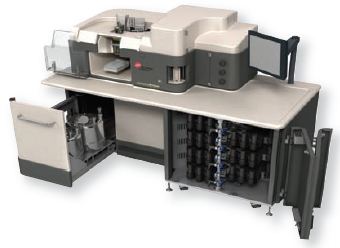 In order to study the molecular and cellular features of stem cells, scientists need to be able to physically separate stem cells from other types of cells in the body. For example, to understand how blood stem cells form in the body and how this process can go wrong in diseases such as leukemia, it is important to study the different types of blood cells.
In order to study the molecular and cellular features of stem cells, scientists need to be able to physically separate stem cells from other types of cells in the body. For example, to understand how blood stem cells form in the body and how this process can go wrong in diseases such as leukemia, it is important to study the different types of blood cells.
A Fluorescence-Activated Cell Sorting (FACS) machine is a specialized device that does exactly that by using the specific light scattering and fluorescent characteristics of each cell type to sort heterogeneous mixtures of cells. The cell sorting machine provides fast, objective and quantitative recording of fluorescent signals from individual cells of interest enabling the separation and study of selected cell populations.
Until recently, this process of identification and separation of distinct cellular populations was complex, time consuming and expensive due to the limitations of the instruments available which only allowed for the separation of a limited number of cell populations at a time. Recently HSCI's FACS Core Facility at the Beth Israel Deaconess Medical Center (BIDMC) has moved one step further as a result of its purchase of a new instrument, the Beckman Coulter Astrios.
The Astrios is a highly sophisticated machine which makes it easier to identify, isolate and purify any particle, even as small as a micron, suspended in a liquid medium. This new instrument is equipped with seven lasers which allow the simultaneous separation of six distinct populations of live cells, significantly simplifying the sorting process while maintaining cell viability.
In the case of scientists studying the blood system for example, the Astrios allows the identification, isolation and purification of a larger number of blood stem cell populations simultaneously than was possible before. In particular, scientists are now able to separate multiple types of progenitor cells (e.g., common myeloid progenitors, granulocyte- macrophage progenitors, and megakaryocyte-erythroid progenitors), as well as the different types of mature blood cells.
Over the last six years, increased access to FACS instruments and to the technical expertise needed to operate them, has made a significant impact on the quality and speed of stem cell research within the HSCI community. The new instrument at BIDMC, by providing more extensive data faster and more efficiently will help scientists accelerate their understanding of the role and function of stem cells in both normal and disease conditions.
